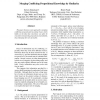Free Online Productivity Tools
i2Speak
i2Symbol
i2OCR
iTex2Img
iWeb2Print
iWeb2Shot
i2Type
iPdf2Split
iPdf2Merge
i2Bopomofo
i2Arabic
i2Style
i2Image
i2PDF
iLatex2Rtf
Sci2ools
ICTAI
2009
IEEE
2009
IEEE
Merging Conflicting Propositional Knowledge by Similarity
The paper discusses a new approach to merging conflicting propositional knowledge bases which builds on the idea that consistency can often be restored by interpreting propositions more flexibly, thus enlarging their sets of models.
| Added | 19 Feb 2011 |
| Updated | 19 Feb 2011 |
| Type | Journal |
| Year | 2009 |
| Where | ICTAI |
| Authors | Steven Schockaert, Henri Prade |
Comments (0)

